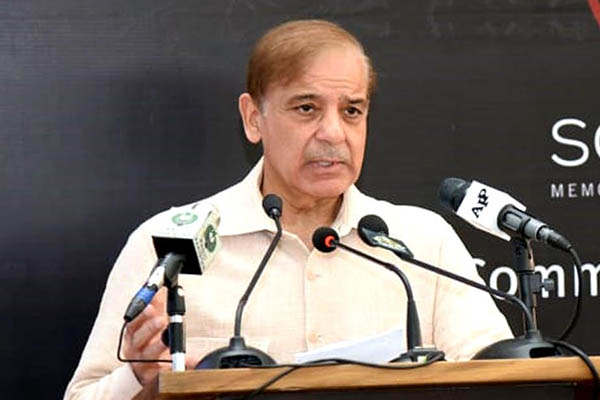
Photo courtesy PID
The coalition government led by Prime Minister Shehbaz Sharif on Tuesday decided to complete its constitutional term until August 2023 and work to bring Pakistan out of a prevailing economic crisis that observers have warned is bringing the country dangerously close to default.
Following a meeting of the federal cabinet on Tuesday afternoon, senior leaders of all coalition partners met in the evening and reportedly decided to resist pressure to call early elections and remain in power for its remaining constitutional tenure. The participants of the evening huddle included Jamiat Ulema-e-Islam (Fazl) chief Maulana Fazlur Rehman; Pakistan Peoples Party Co-chairman Asif Ali Zardari; Muttahida Qaumi Movement-Pakistan chief Khalid Maqbool Siddiqui; Balochistan Awami Party President Khalid Magsi; Amir Haider Khan Hoti of the Awami National Party; Jamhoori Watan Party President Shahzain Bugti; and several members of the federal cabinet.
According to sources who attended the meeting, the coalition partners discussed the country’s political situation in detail and decided—in principle—to complete the government’s constitutional tenure and work to reform controversial legislations, including the Elections Act and the National Accountability Bureau. Additionally, they said, the coalition leadership had decided to work toward reviving the economy by taking “tough” decisions that risk increasing inflation in the short-term.
The meeting’s participants said that all allied parties had assured the prime minister that they would support the government’s tough measures, including a potential end to an unfunded fuel subsidy announced by ousted prime minister Imran Khan. They said the premier had been advised to take immediate measures to stabilize the economy without fear of any resistance from coalition partners.
The incumbent government, which came into power on April 13, has come under increasing criticism in recent days over its perceived inability to take controversial decisions that are considered vital for the country’s economic prosperity. Confusion over whether it can revive a suspended bailout program with the International Monetary Fund has triggered uncertainty that has seen the rupee continue to slide against the U.S. dollar and left a substantial dent in the Pakistan Stock Exchange. The government is also under pressure from ousted prime minister Imran Khan’s campaign for early elections, which observers say has support in some quarters of the establishment.
Beyond the economic and political situation, the meeting also reportedly discussed the Supreme Court ruling on applicability of Article 63(A) of the Constitution and the potential risk it poses to the Punjab government led by Chief Minister Hamza Shehbaz.
According to the apex court, votes of dissident lawmakers cannot be counted, which leaves Hamza without the majority needed to remain chief minister, as he had received the votes of over 20 dissident PTI MPAs. The PMLN and PPP coalition currently has one more vote than rivals PTI and PMLQ, leaving the results of the contest in the hands of independent candidates.
